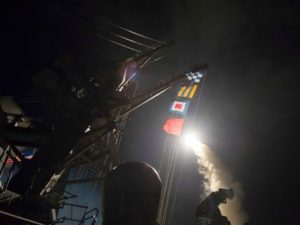Special to WorldTribune.com
Special Report by Dr. Jack Caravelli, Geostrategy-Direct.com
President Donald Trump has backed up remarks about his revulsion at the Syrian military’s use of sarin gas that killed some 100 civilians and injured scores more by ordering a large cruise missile attack against the Syrian air base from where the attack was launched.

At least 59 Tomahawk cruise missiles launched by two US warships in the Mediterranean Sea were used to destroy aircraft and infrastructure at Ash Sha’irat Air Base in western Syria according to various media reports.
Speaking from Mar-a Lago, Florida where he was meeting the Chinese president and claiming that the attack was in “the vital national security interest of the United States,” the president took action that President Barack Obama had shunned for years in the face of numerous past Syrian atrocities, including similar chemical weapons attacks.
The president also called on “all civilized nations” to unite to stop the carnage in Syria.
Trump’s actions, albeit dramatic and a complete break with past US policy, were modest in scope. By attacking only one Syrian military target, Trump preserves for the administration the option of attacking other Syrian military targets such as broader elements of its air force or destroying other air fields such as by cratering runways so that they cannot support air operations.
From a broader perspective, the immediate impact of the attack will be profound across the Middle East and beyond.
In Syria, President Bashar al-Assad now knows that he cannot carry out similar future attack with impunity. For years he has been able to avoid retribution for his actions such as the use of barrel bombs by the combined support of Russia and Iran coupled with Obama’s overt refusal to engage Syria militarily.
Related: See Current Edition of Geostrategy-Direct
That assurance of nonaccountability exists no longer.
Russia has yet to react to the attack on its client publicly but it is reasonable to conclude that the Kremlin’s reaction will be one of outrage mixed with embarrassment that it could not protect Syria against U.S. actions.
Russian President Vladimir Putin may well have underestimated Trump’s resolve and capacity to act decisively.
That will do little to improve the bilateral relationship already mired in controversy. U.S. Ambassador to the United Nations Nikki Haley said earlier this week that Russia could not avoid responsibility for supporting Assad’s past and present use of weapons of mass destruction against his own civilians.
U.S. willingness to act also will be viewed closely throughout the region by America’s friends and foes alike.
Friendly Gulf Arab states such as Saudi Arabia and Bahrain will find reassurance in a U.S. administration that will act to defend its interests. Israel almost certainly will see the Trump decision in the same light.
Iran will be important to watch. It also is a long-time supporter of Assad and has contributed men and materiel to Syria’s defense.
As the world’s largest sponsor of terrorist activity, Iran has through such proxies as Hizbullah the wherewithal to order a wave of retaliatory terrorist strikes against U.S. or possibly Israeli targets in the Middle East.
